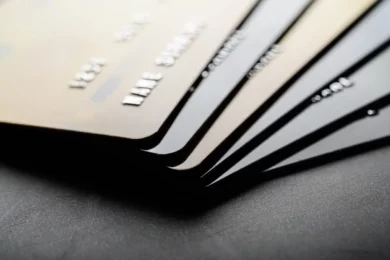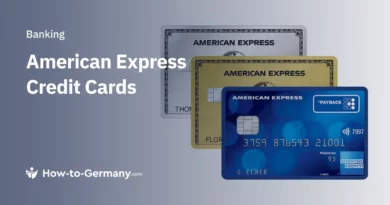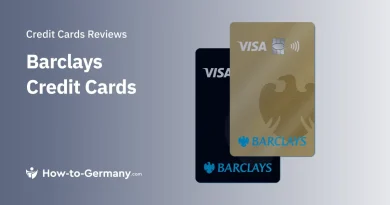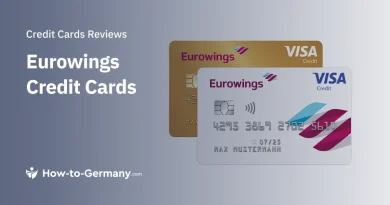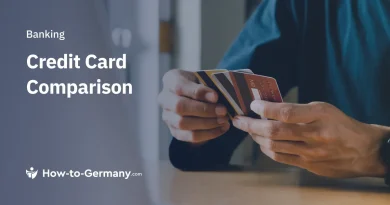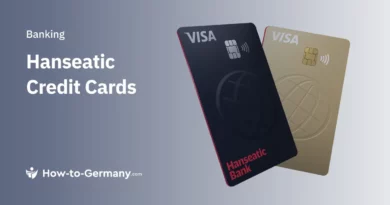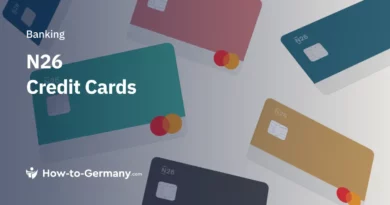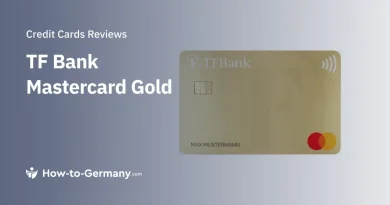How we earn our money
We finance our services on how-to-germany.com through affiliate programs.
When a user orders a financial product through our site and their application is approved, we may receive a commission from some providers. It’s important to note that this does not in any way influence our independent ratings and recommendations.
All the products we present on how-to-germany.com are selected for their quality, range of services, and excellent value for money.
Credit Cards in Germany – Guide for Expats
- With a charge credit card, you repay your full credit card bill each month — without any interest, if you make timely payments. Revolving credit cards allow you to borrow money for a longer period and let you pay in installments, albeit with interest. In addition to genuine credit cards, you can also choose between debit cards and prepaid cards without an overdraft function.
- Your Schufa score (credit rating) decides what credit card and credit limit you can get.
- New in Germany? Look at the TF Mastercard Gold or Gebührenfrei Mastercard Gold — 2 free credit cards with repayment options in monthly installments, travel insurance, discounts, and a mobile banking app in English. The TF Mastercard Gold is the best credit card for starters in Germany.
- If you’ve been in Germany for a while and have a regular income, consider the Hanseatic Bank GenialCard or awa7® Visa. Both are free credit cards with no annual fee, offering interest-free repayment for 3 months, adjustable repayment rates, and a user-friendly mobile banking app available in English. The Hanseatic Bank GenialCard is the best credit card for established expats in Germany of all the cards we tested.
- Miles and rewards programs aren’t as prevalent in Germany. If you fly a lot, look at Lufthansa or Eurowings credit cards, which are part of the Miles & More program. The American Express credit cards also offer an excellent rewards program. For shopping cashback, consider American Express Payback, but note that American Express isn’t as widely accepted as Visa or Mastercard.
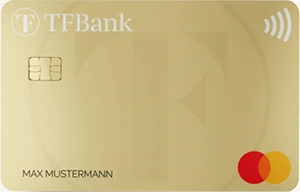
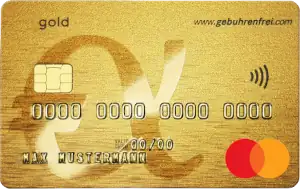
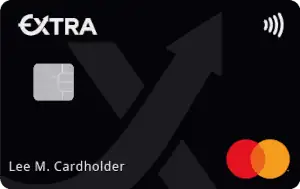
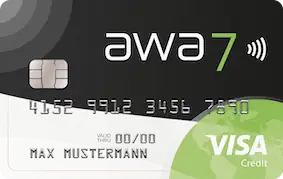
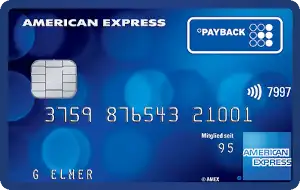
If a credit card provider’s site is only in German, use Chrome’s auto-translate (right-click → “Translate to English”). If buttons or links don’t respond well in the translated version, switch back to German and try again.
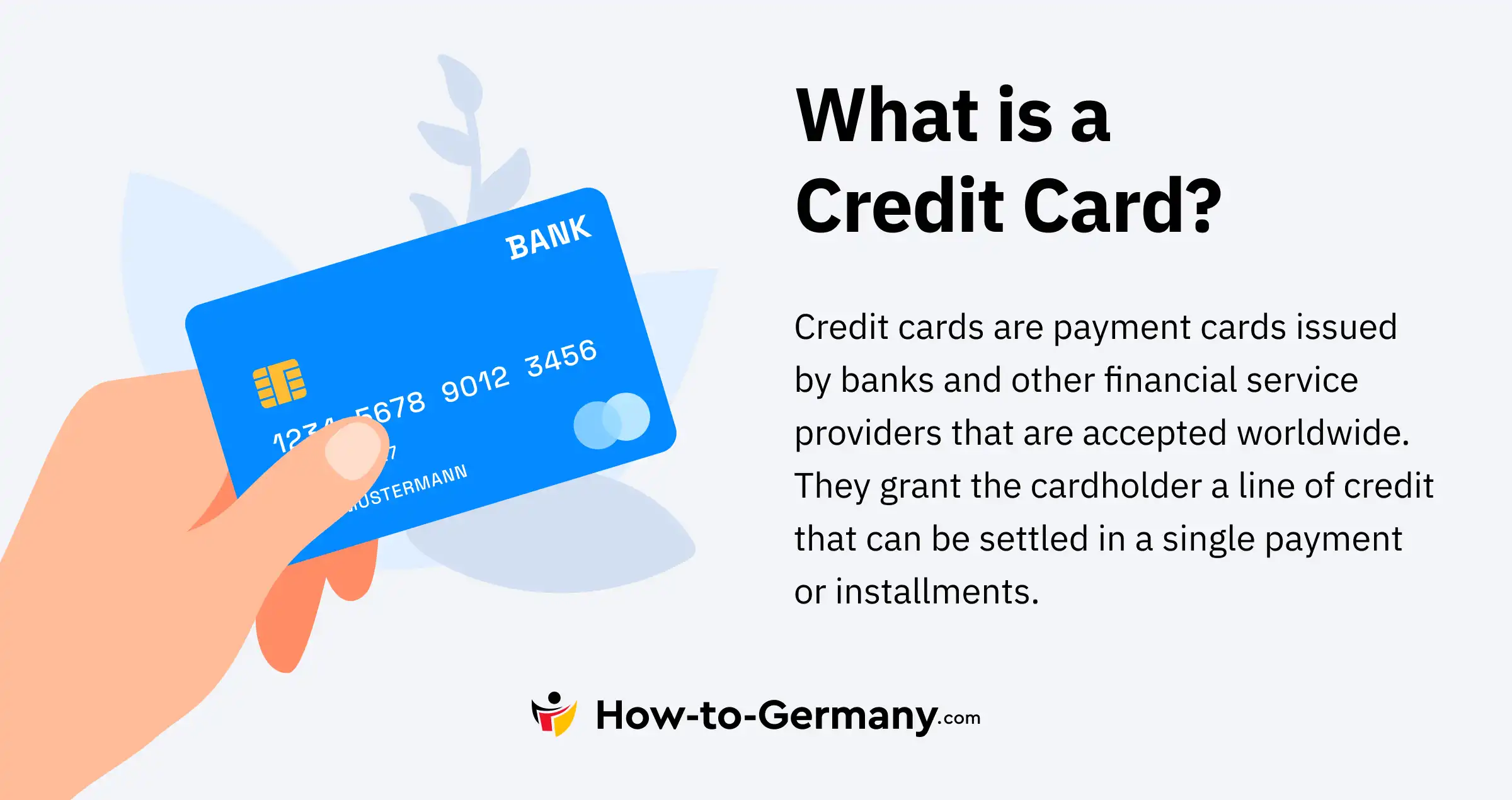
Types of Credit Cards in Germany
There are 4 different types of credit cards in Germany: revolving credit cards, charge credit cards, prepaid credit cards, and debit cards. Each has its unique features and benefits tailored to different user needs. Understanding the various credit card types is crucial for selecting the best option for your needs as an expat.
There are numerous credit card offers in the German market designed for different needs. Our credit card comparison focuses on the needs of expats, highlighting flexibility, accessibility, and long-term costs.
Revolving Credit Card – Monthly Billing and Option for Installment Payments
In Germany, the term “Kreditkarte” describes all varieties of credit cards. However, revolving credit cards stand out as the only “real” credit cards in the classical sense. With this card, all purchases are combined over a month, and the user receives an interest-free payment period of approximately 4 weeks. Depending on the German credit card provider, this period might be longer. With the Barclays Visa credit card, for example, it is up to 59 days.
After this time, credit card users can decide whether to pay the total amount due, without interest rates, or in installments. If they opt for installments, they’ll be charged interest based on a percentage of the outstanding amount. This kind of loan is more adaptable than a fixed-term loan. However, you should always expect a high interest rate for a revolving credit card. Late payments of the full amount also incur interest.
Credit card providers require a minimum monthly repayment — either a percentage of the outstanding balance or a fixed amount. Depending on the provider, repayments can be made manually via SEPA transfer or direct debit.
Due to their installment payment feature, revolving credit cards are often only provided to individuals with a clean credit history, a stable income, and no negative records. Applicants with a good credit score generally have better chances of approval and may also receive higher credit limits.
Prepaid credit cards or debit cards are often more suitable for individuals with unstable earnings, students, and newcomers without a financial history in Germany.
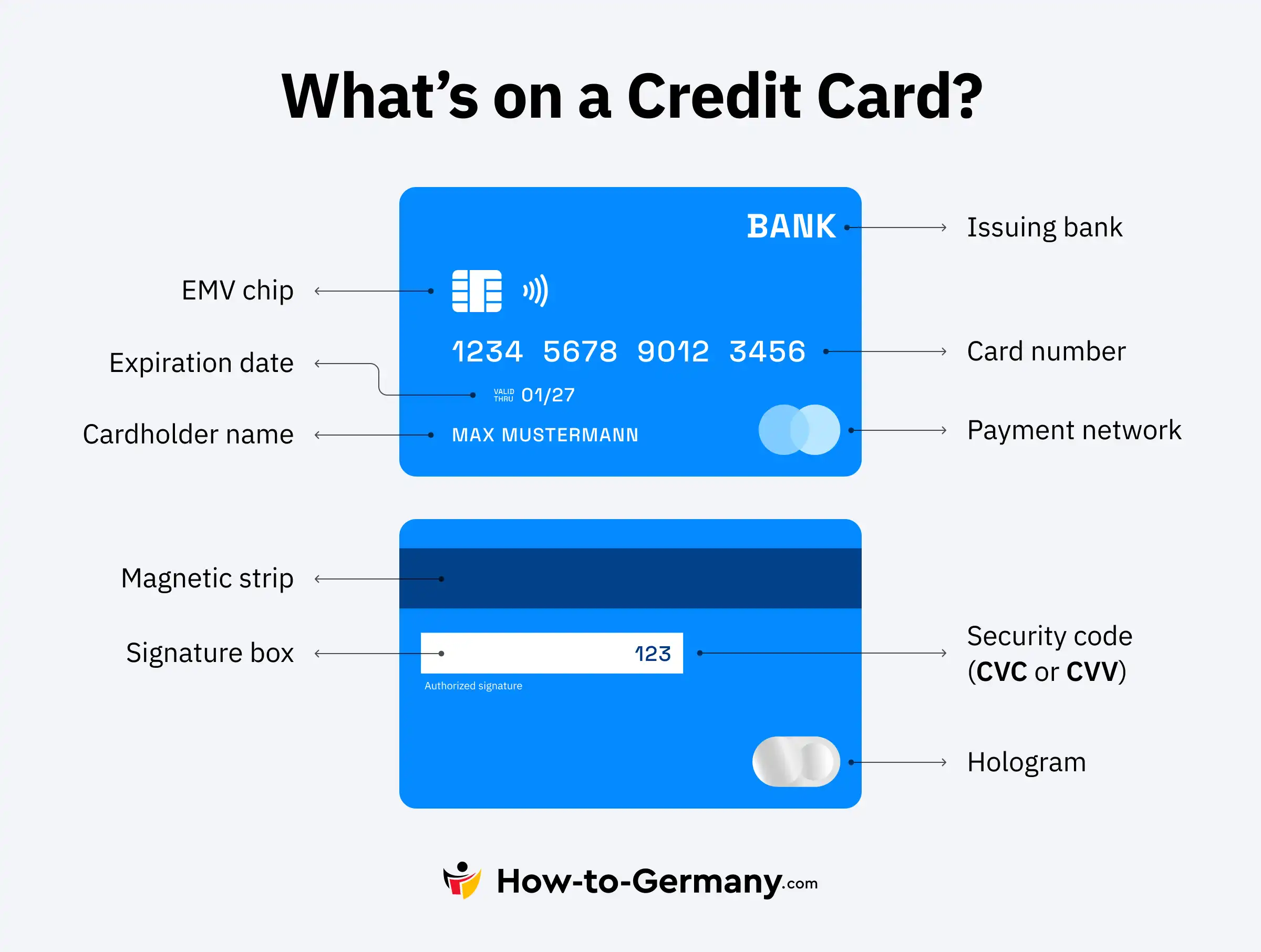
Charge Credit Card – Monthly Deduction of Accumulated Charges
With charge cards, you borrow money for a short period only. The credit card company sends a monthly bill and then automatically takes the due amount. This provides a short-term “loan” without interest of up to 4 weeks, allowing you to make purchases even if you don’t have sufficient funds in your account yet. Please ensure that you have enough money in your checking account at the end of the billing period to repay the full amount. Otherwise, additional costs may be incurred. Repeated late payments may also result in the cancellation of the card.
Unlike revolving credit cards, with a charge credit card, you typically cannot pay in installments. The total amount is taken all at once. However, sometimes arrangements can be made with the credit card provider.
Most credit card providers offer either revolving credit cards or charge cards, so your choice of provider will also depend on which type of credit card you prefer.
Prepaid Card – Requires Preloading the Card Account
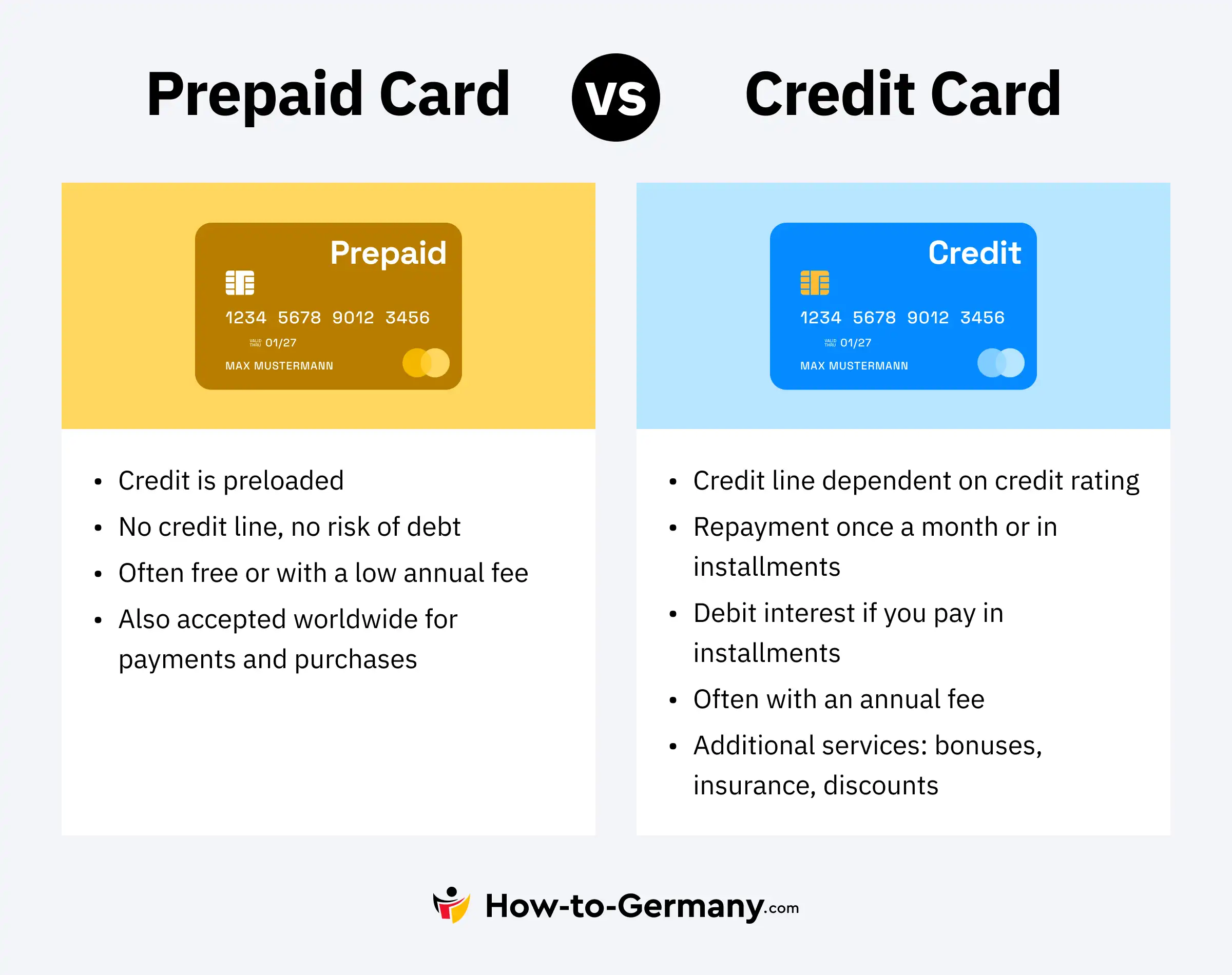
A prepaid credit card isn’t like a typical credit card. It only works if you’ve added money to the credit card account beforehand. Think of it as refilling a mobile phone: you can use it as long as there’s a balance. Without funds, the card won’t work until reloaded.
For students or those with fluctuating income who can’t get a standard credit card, prepaid cards can be a great choice. They offer control over expenses since you can only spend what you’ve loaded. There’s no risk of unexpected debt or overspending. Additionally, if someone steals the card, they can only use the amount loaded onto it, making prepaid cards a secure payment method.
Prepaid cards are issued as Visa or Mastercard. They enable card payments and cash withdrawals worldwide.
Note that some rental car companies, hotels, or online platforms may not accept prepaid credit cards, as they don’t include a credit line.
Debit Card – Direct Deductions from the Bank Account
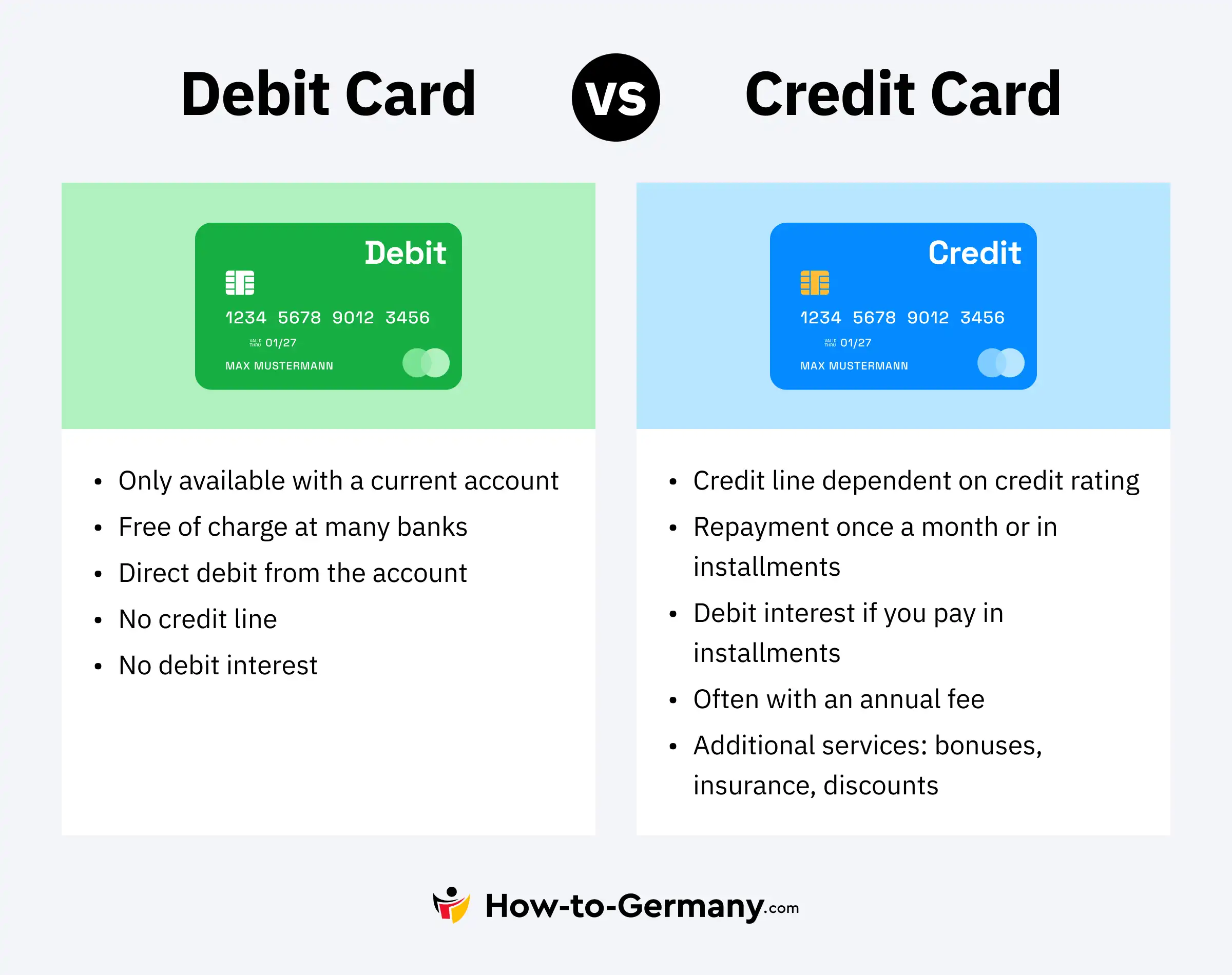
Using a debit card, the amount for any purchase or service is taken immediately from the linked current account. Unlike credit cards, debit cards don’t offer credit. However, you can still use them for many functions that a credit card offers: withdraw cash, make contactless payments, and make online purchases. Debit cards aren’t standalone; they’re always associated with a checking account. They’re ideal for those who want a direct overview of their spending and frequently make online payments. Modern debit cards feature the Visa or Mastercard logo and can be used worldwide.
The Schufa Check and Its Impact on Credit Card Applications
In Germany, anyone can apply for a credit card, provided they meet certain basic requirements, including being a resident of Germany and legal age. Beyond these basic criteria, credit card providers often have additional conditions that applicants must satisfy to get a credit card. Therefore, the type of credit card you can obtain usually depends on your credit history in Germany.
When applying for a German credit card with a credit limit, banks consider this a potential risk. To evaluate this risk, they conduct a credit check to assess the applicant’s payment history data. This data is sourced from Germany’s largest credit reporting agency, Schufa.
If you have a negative Schufa record due to serious payment delays or similar reasons, you may not be approved for this credit card. The bank must ensure that the customer can repay any borrowed money promptly.
However, debit and prepaid cards are often issued without a prior Schufa check. Since these cards don’t offer actual credit, they don’t pose a significant risk to the bank. Yet, they still provide users with the essential features of a credit card, including cashless transactions and ATM cash withdrawals.
Fees associated with German Credit Cards
With a classic revolving credit card in Germany, holders must consider interest when using the flexible repayment option. Specifically, if the credit card bill is not fully paid within the interest-free period, a longer repayment period or installment plan is chosen instead. Interest rates can vary significantly depending on the credit card company.
There can also be additional fees when using the credit card outside Germany or when making cash withdrawals from ATMs. Some providers offer free payments and withdrawals in the eurozone and abroad, depending on the card type.
Beyond these fees, some credit card providers may also have an annual fee, which can vary significantly.
Annual Fee
Not every credit card has an annual fee. Typically, cards that offer more than the basic features charge this fee. These additional features can range from discounts and bonus programs to insurance benefits, such as travel or rental car insurance. The more features a credit card has, the higher the annual fee tends to be. In most cases, a premium credit card comes with a high annual fee but also offers numerous benefits, such as insurance packages, exclusive access, and cashback programs.
Cards that offer many high-quality features often come with a high annual fee. If these extra features are not useful to you, it’s better to choose a standard credit card to save money. While some benefits, such as insurance or discounts, can save money, they’re only beneficial if utilized. For instance, if someone travels only once a year, travel insurance or a frequent flyer program may not be useful. But for frequent travelers, these features can offer great value. However, there are also some free credit cards on the German market that offer additional benefits. If a card with high benefits comes without an annual fee, check whether it is waived for the first year as part of a promotion.
Even free credit cards without an annual fee might incur other fees for card transactions. Therefore, it’s always a good idea to review the terms or contact the credit card provider to inquire about all potential fees before obtaining a card.
Foreign Currency Fee
When using credit cards outside the countries of the eurozone, credit card providers such as VISA, MasterCard, American Express, and Diners Club are very useful due to their wide global acceptance. They can be used almost anywhere. When you pay or withdraw cash in a foreign country, the transaction is processed in the respective national currency. For this convenience, many credit card providers charge a fee for transactions in foreign currencies.
The foreign currency fee can vary a lot, typically ranging from 1% to 5% of the transaction amount. On average, however, most banks charge a surcharge of 1% to 3% for payments made in a foreign currency. If you travel frequently, a no-foreign-fee credit card is a good option to avoid extra charges. Otherwise, these fees can add up quickly over time.
Cash Withdrawal Fee
Credit cards are a widely accepted form of payment. They are practical, especially when you don’t have exact change at the checkout or for online shopping. Yet, there are times when cash is preferred or necessary. Fortunately, credit cards also allow you to withdraw money.
The fees for withdrawing cash using a credit card depend on the provider. The amount they charge can vary. Some credit cards offer free cash withdrawals worldwide, which is especially useful when traveling. Other credit card providers permit a certain number of free cash withdrawals per month or year, and then charge a fee for any additional withdrawals. Others may only allow free cash withdrawals at their bank’s ATMs.
It’s also crucial to note where the free cash withdrawals apply. With some credit cards, you can withdraw money without any fee worldwide. With others, free withdrawals might be limited to Germany or countries within the eurozone. And there are credit cards that don’t offer free cash withdrawals at all.
Please note: Any additional fees charged directly by the ATM company are separate from the credit card provider and are not included in the credit card fees.
Interest Rates
Genuine credit cards provide a monthly credit limit to cardholders. Traditional credit cards also offer the option to repay the borrowed amount in monthly installments. When cardholders choose this repayment method, they are required to pay interest on the borrowed amount. Typically, the interest rate for credit cards is variable and is charged only on the borrowed amount, not the entire credit limit.
For a credit card comparison, it’s essential to focus on the effective annual interest rate rather than just the nominal or borrowing rate. The effective annual interest rate provides a comprehensive view of the total interest costs, whereas the nominal rate only indicates the monthly interest charge, making it appear lower.
Best Free Credit Cards for Beginners
These fee-free cards are ideal if you’re starting a new life in Germany and need simple, flexible tools. They are much easier to get than the other ones, and still allow users to save money on fees and travel expenses.
This doesn’t necessarily mean you’re automatically approved when you apply. But you have a better chance of getting approved with these credit cards than with the others. They are some of the best free options for newcomers who want to avoid additional fees and enjoy extra services. However, you pay a high interest rate if you opt for the installment function.
TF Mastercard Gold
The TF Bank Mastercard Gold is the best credit card for beginners in Germany, ideal for new expats with limited credit history. It comes with no annual fee, free cash withdrawals worldwide, and no foreign currency fees. The card offers travel insurance and cashback on travel and rental car bookings. Just remember to cover at least 50% of the travel booking with the card to get the insurance benefit.

Gebührenfrei Mastercard Gold
Advanzia Gebührenfrei Mastercard Gold is also a great credit card for starters in Germany. It’s easily accessible to expats, and you don’t need a long financial history to get one. It has very similar conditions to the TF Mastercard Gold. The credit card has no annual fee, offers free withdrawals, and comes without foreign currency fees. However, there’s a small hidden currency conversion surcharge fee. Additionally, it also comes with travel insurance and cashback on travel and rental car bookings.

Best Free Credit Cards for Established Expats
These cards offer the best conditions but require a long and clean credit history (Schufa).
Hanseatic Bank GenialCard
The Hanseatic Bank GenialCard is the best credit card in Germany, perfect for frequent travelers and online shoppers. This credit card offers no annual fee, no foreign transaction fees, and free cash withdrawals outside Germany (note: ATM operators may charge their own fees). The card supports contactless payments and is compatible with Apple Pay and Google Pay. Users can choose between full repayment and flexible installments, with the first three months of installment payments being interest-free. Additional perks include up to 7% discounts on travel bookings and access to exclusive shopping deals. No new bank account is required to apply.
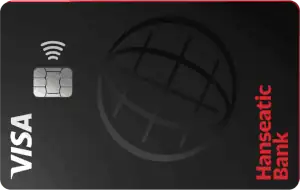
awa7® Visa Card
The awa7® Visa Card is a sustainable, fee-free credit card in Germany that combines financial convenience with environmental responsibility. For every awa7® Visa credit card account opened, seven new trees and native shrubs are planted in Germany. In addition, a portion of the proceeds from card usage goes toward protecting and reforesting German forests. The card offers no annual fee, free cash withdrawals outside Germany, and no foreign transaction fees. It supports contactless payments and is compatible with Apple Pay and Google Pay. Flexible repayment options are available, with payments automatically debited from your existing bank account. While the card does not include built-in insurance, optional coverage can be added for an additional fee.

Barclays Visa
A completely free credit card that offers some of the best conditions a credit card can have. However, we have recently stopped recommending it since the approval rates are very low for foreigners, and the mobile banking app is only in German.
Its premium version, the Barclays Gold Visa Card, includes additional insurance and travel perks but is also pricier and harder to obtain for expats. Barclays Bank also offers a premium version of its cards, the Barclays Platinum Double, which combines a Visa card and a Mastercard, offering various additional benefits. As with the Barclays Visa, however, expats should expect to have limited access to these cards.
Best Cashback Credit Cards in Germany
When it comes to cashback, the credit card that offers the most points or cashback rewards will rank the highest. With cashback programs, you can effectively earn money back on every purchase if you pay off the balance in a timely manner.
American Express Payback
While this credit card falls short in some areas compared to others, it does offer one of the better cashback rates in Germany.
In most cases, it doesn’t matter if the store is not a partner; you will still get cashback points for your purchases. It is a charge credit card, meaning that you cannot repay the borrowed amount in monthly installments.

Best Student Credit Cards in Germany
Students coming to Germany will typically not have a long credit history or complete documents. Their financial situation will also be limited compared to most. Therefore, the best credit cards for students will be those with high approval rates that offer the benefits of financial flexibility.
Best Travel Credit Cards in Germany
The best credit cards for travel are those that offer the most perks related to traveling. This includes travel insurance, miles, travel-related points, discounts, access to the airport lounge, and more. The absence of foreign currency fees and free cash withdrawals worldwide also contribute to maximum financial flexibility when traveling.
Best Business Credit Cards in Germany
The best business credit cards in Germany typically offer different types of perks, including competitive rewards programs tailored to meet the needs of businesses, cashback, travel rewards, or discounts on business expenses such as office supplies and travel.
How to Get a German Credit Card: A Step-by-Step Guide
Here’s a quick step-by-step guide on how to apply for any German credit card.
Step 1: Check Your Eligibility
As with any product, each credit card will have its eligibility requirements. The most common eligibility requirements for a credit card in Germany are that you must have at least a German bank account, a German phone number, a valid passport, and be at least 18 years old. Non-EU citizens may also require a residence permit and a work permit for Germany.
To check your eligibility for the credit card you’re interested in, simply follow the link to their application page.
Step 2: Fill out the Online Application Form
Online credit card applications will request your personal details. This includes your name, address, birthdate, and contact information. If you’re asking for a certain credit limit, you must include information about your income in your application.
If a credit card provider’s site is only in German, use Chrome’s auto-translate (right-click → “Translate to English”). If buttons or links don’t respond well in the translated version, switch back to German and try again.
Step 3: Pass Video Identification Process
After submitting your online application form, the next step is to wait for the credit card bank to contact you using the contact information you provided. Once they contact you, you must verify your identity with them. How this is done would depend on the bank in question, but typically, the application process involves a video call with their customer service agent.
After your identity is verified, you will receive the credit card along with an activation letter, which contains important information and steps to activate your account.
Conclusion
Credit cards are a great way to expand your financial freedom when used and managed wisely. It is also one of the few financial tools available that provide you with more benefits and advantages the longer you have it and the more you use it.
The credit cards listed above all offer excellent benefits; however, we believe that the TF Bank Mastercard Gold is the best credit card in Germany due to its excellent terms and perks. Choosing the right free credit card or a credit card offer subject to fees depends on your personal needs, spending habits, and how you plan to use it in everyday life.
If you’re considering getting a credit card and intend to use the installment repayment feature, it’s crucial to research the interest rates first. This will help you understand how cost-effective the card is for your specific needs. When conducting a credit card comparison, the effective annual interest rate is the most reliable figure.
Frequently Asked Questions – Expats & Credit Cards
Yes, foreigners can get a credit card in Germany. However, expats often face more hurdles than German citizens. Many banks require a German credit history (Schufa), a registered address, stable income, and a local bank account. Newcomers frequently lack these, making approval for traditional credit cards more difficult. As an alternative, many expats start with a debit or prepaid card, which may not require a Schufa check.
Free credit cards are usually advertised as having no annual or monthly fees. However, this doesn’t mean they are completely free from charge. Many free credit cards still charge fees for specific transactions, particularly for payments made in foreign currencies or cash withdrawals at ATMs. A credit card is truly free only if it has no annual fee and supports worldwide free payments and charge-free withdrawals.
Visa and Mastercard are widely accepted in Germany, especially in larger stores, supermarkets, restaurants, hotels, and online shops. However, some smaller businesses may not accept credit cards at all, or only for purchases above a minimum amount.
American Express and Diners Club cards are accepted far less frequently. Many merchants exclude them due to higher transaction fees, so it’s also advisable to carry a Visa or Mastercard.
Contactless payments using NFC-enabled credit cards or mobile wallets, such as Apple Pay or Google Pay, are increasingly popular in Germany and are often accepted even when traditional card payments are not explicitly advertised.
There are 4 different types of credit cards in Germany: charge credit cards, revolving credit cards, debit cards, and prepaid credit cards.
A charge credit card compiles all purchase payments, typically within 30 days. After this period, a credit card statement is generated, which the owner must pay directly.
A revolving credit card is a type of credit card that provides its owners with a line of credit to use, allowing them to repay the balance in monthly installments with an interest rate applied to the outstanding balance.
A debit card is directly associated with the owner’s current account. Each time the debit card is used, the amount is automatically deducted from the linked bank account.
To use a prepaid card, you must first transfer money to the card. For this, you do not necessarily need a German bank account.
The most common type of credit card in Germany is the charge credit card. Charge credit cards require the cardholder to pay the outstanding balance in full at the end of each month, rather than carrying a balance over time. Debit cards rank second. Revolving credit cards and prepaid cards play a relatively minor role in Germany.
The best credit card in Germany is the TF Bank Mastercard Gold due to its excellent terms and perks. Although the bank conducts a credit check before issuing the card, the barriers to entry are relatively low compared to other cards. You can order this card with any German bank account.
The easiest credit card to get approved for is one that is not strict with your credit history, among other requirements. Based on our research, these are TF Bank Mastercard Gold and Gebührenfrei Mastercard Gold. Both cards are, therefore, also well suited for newcomers who do not yet have a long credit history in Germany.
Yes, most German credit cards use strong authentication systems for online payments, including Mastercard Identity Check and Visa Secure. These systems add an extra layer of protection by requiring a verification code or app confirmation during the checkout process.

